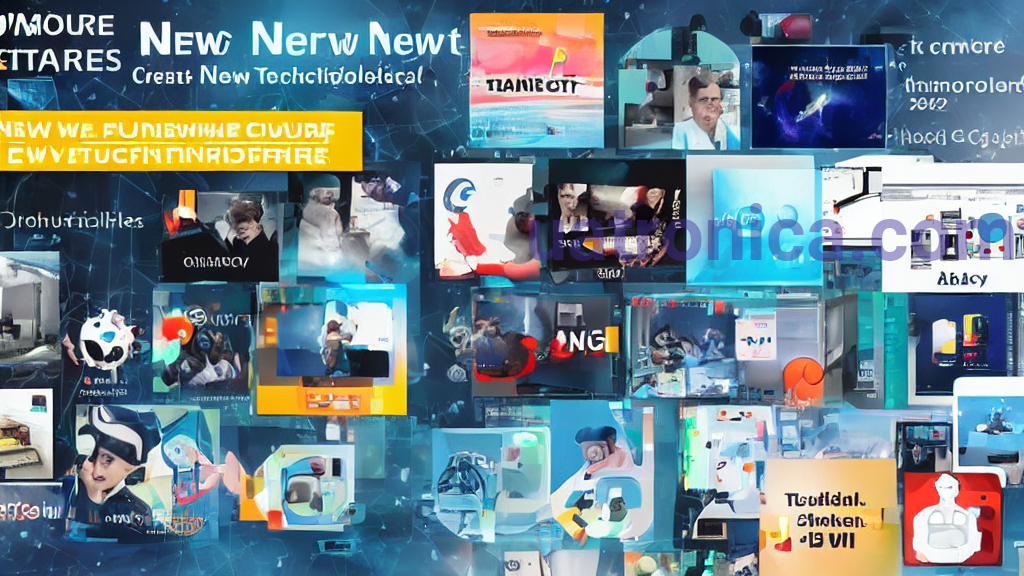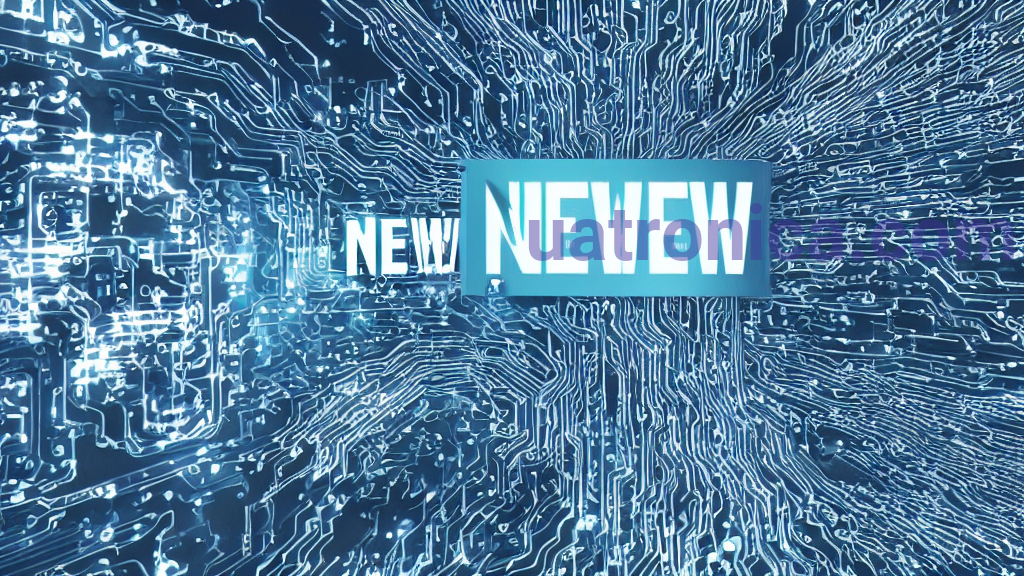13 Unprecedented Technological Developments That Will Define Tomorrow: Experts' Opinion on the Future of Electronics
The modern world of electronics is constantly changing, and new technological developments are shaping our future every day. These events not only transform the way we live, but also rewrite the rules of the game in the market. In this article we will consider 13 unprecedented technological developments, which will change our world, based on the opinion of leading experts in the field of electronics and engineering. We will also try to understand how these technologies can affect our daily life, business and environment.
1. Quantum Computers
Quantum computers are slowly becoming a reality, but their impact is already being felt. This technology promises an extraordinary speed of data processing, which exceeds the capabilities of classic computers. According to Oleksiy Shevchenko, an expert in the field of quantum mechanics, "Thanks to quantum computing, we will be able to solve problems that previously seemed impossible." Several companies, such as IBM and Google, are rapidly developing this technology, which promises to revolutionize big data processing.
With the development of quantum computers, an accelerated solution of complex scientific and business problems is possible, in particular, in the field of climate change modeling and optimization of financial portfolios.
- The IBM Quantum Experience project is open access to quantum computers.
- Google Quantum AI – development of algorithms for quantum platforms.
2. AI and Machine Learning
Artificial intelligence (AI) and machine learning accompany us every day. In financial institutions, healthcare and retail, this technology is transforming the way data is analyzed. For example, according to a McKinsey & Company report, more than 70% companies plan to use AI to improve business processes in the next three years.
AI will also become an important partner in creating optimized logistics routes, analyzing consumer demand, and even in medical diagnostics, where AI is able to detect patterns that are difficult for humans to notice.
| Sphere | Example of use | Benefit |
|---|---|---|
| Finances | Risk analysis | Accurate forecasts and decisions |
| Health care | Medical diagnosis | Improving the accuracy of diagnoses |
| Retail trade | Personalization of offers | Sales growth |
3. Smart Devices
Smart devices are becoming more and more integrated into our lives. From smart thermometers to health-monitoring bracelets, these electronic components are capable of collecting vast amounts of data about the user. According to forecasts, the volume of the smart device market will reach 1 trillion dollars in the next 5 years.
These devices not only improve comfort, but can also increase safety, for example with smoke detectors that alert owners via mobile apps.
4. Blockchain Technologies
Blockchain has already changed approaches to information storage and transaction security, but its potential is actually great. The use of blockchain technologies in the context of electronics manufacturing can guarantee the security of supply of components, reduce risks and increase transparency. The head of one of the well-known startups in this field, Iryna Kovalenko, notes that "the blockchain model is capable of changing the rules of the game in all industries related to the storage of values."

In addition, blockchain can be used to manage copyrights for digital content, preventing piracy and ensuring fair compensation to authors.
5. 5G Technologies
The deployment of 5G technologies promises unprecedented data transfer speeds and reduced delays. This technology will become the basis for the development of autonomous cars, as well as intuitive smart homes. According to forecasts, approximately 1.7 billion active subscribers will use 5G by 2025.
5G will also allow expanding the possibilities of virtual and augmented reality, uploading large volumes of data in real time, which will open new horizons for games and interactive applications.
6. Internet of Things
With the acceleration of technological developments, the Internet of Things is becoming an important element of the future of electronics. According to Statista, the number of IoT devices will exceed 75 billion by 2030. This opens up new opportunities for home automation, industrial processes and personalization of service.
IoT not only makes life easier, but also improves environmental awareness, allowing for more efficient use of resources such as water and energy.
7. Nanotechnology
Nanotechnology is gaining momentum in the development of new electronic components. They allow the creation of miniature but effective parts that can be used in many fields, including medicine and computer technology. A researcher in this field, Professor Volodymyr Petriv, notes that "nanotechnologies open new horizons in electronics design."
These technologies make it possible to create lighter and more productive devices that can work with lower energy consumption.
8. Virtual and Augmented Reality
Virtual (VR) and augmented reality (AR) provide new opportunities for interactive learning and entertainment. These technologies are used in all areas, from education to marketing. Research shows that the market for VR and AR technologies will grow to 200 billion dollars by 2025.
In education, for example, AR can improve the perception of information, and VR allows you to immerse yourself in the environment without leaving the classroom.
9. Downloadable Electronics
Downloadable electronics, or electronics that have the ability to change their physical form, opens up new possibilities for wearables. A better understanding of this technology could lead to an increase in the production of devices that can adapt to the needs of users. Experts say that this can radically change the design and functioning of electronics.
This evolution will potentially change the way we use electronics in everyday life, from clothing to personal devices.

10. Ecological Electronics
Reducing waste and increasing energy efficiency are two main problems that need an urgent solution. Ecological electronics is a new approach that involves the use of environmentally friendly materials and technologies for the production of electronics. Mykola Bondarenko, an expert in the field of sustainable development, emphasizes: "At each stage of the life cycle of electronic devices, we must implement green technologies."
This includes a program for the secondary use and recycling of old devices, which will significantly reduce the environmental footprint.
11. Autonomous VEHICLES
Autonomous cars are one of the most discussed aspects of the future of electronics, as they threaten the traditional concept of driving. Companies like Tesla and Waymo are actively working on this technology, which could completely change the transportation infrastructure. The autonomous vehicle market is estimated to be over $600 billion by 2030.
This will not only reduce the number of traffic accidents, but also optimize the use of cars, reducing congestion and improving the environment.
12. Biotechnology
Biotechnology has enormous potential in the field of electronics. Synthetic biological systems can simplify the production of electronic components. Leading universities are conducting research in this area, and we can expect their results to influence digital accessibility and innovation. In the professional community, it is believed: "Biotechnologies will become an important element not only in medicine, but also in electronics."
These studies will open up new opportunities in the development of new types of materials and components for electronics that can be more efficient and environmentally friendly.
13. Ultra-Thin Displays
The technology of ultra-thin displays is changing the perception of screen technology. They are light, flexible and consume less energy, making them an ideal alternative to traditional displays. According to a leading analyst, the growth in demand for these technologies in the coming years will contribute to their mass implementation in the fields of communications and entertainment.
These displays can not only change product design, but also provide new opportunities for interactivity in advertising and consumer experience.
All these technologies are on the verge of a revolution in the sectors related to the future of electronics. It is important to note that each of them has enormous potential, capable of transforming our daily life and productivity in a wide variety of areas.
If you are interested in learning more about new electronic components and their role in the future, visit our articles: A new era of electronics and Technological innovations of semiconductors.
Also, for those interested in purchasing new electronic components, we recommend that you pay attention to our catalog, where you can find many products, such as resistor RC2010JK-072K2L-YAG and capacitor CC0603JRNPO9BN101-YAG.
Stay tuned, because the future of electronics promises to be incredibly exciting!










